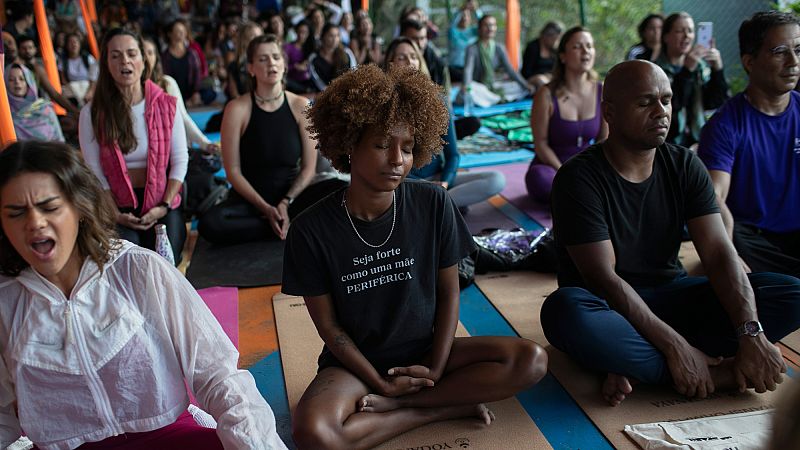Expanding Access to Yoga in Brazil
A new initiative, launched by Yoganaya International School and the company Mude, is set to transform the lives of aspiring yoga instructors from low-income communities in Rio de Janeiro and São Paulo. The program aims to train approximately 180 future teachers over a period of 14 months, offering them not only the opportunity to learn yoga but also essential resources to support their journey.
Participants will receive a range of benefits designed to ease their transition into the teaching profession. These include uniforms, yoga mats, speakers, and microphones, which are crucial tools for delivering effective yoga classes. In addition, the program provides stipends and ongoing support as they seek employment in the job market. This comprehensive approach ensures that participants can focus on their training without the burden of financial instability.
One of the standout stories from this initiative is that of Luciene Costa, a 54-year-old hairdresser who discovered yoga as a way to manage her back pain. What began as a personal health journey has now evolved into a dream of leaving her salon behind to become a yoga instructor. Her story highlights the transformative power of the program, as it offers individuals from diverse backgrounds the chance to pursue new careers and contribute to their communities.
The organizers of the project have a clear vision: to challenge the perception of yoga as an activity reserved for the elite. By providing access to training and resources in underserved areas, they hope to make yoga more inclusive and accessible to all. This effort aligns with broader goals of promoting sustainable careers in favelas, where economic opportunities are often limited.
Benefits of the Program
The initiative is structured to provide both practical and emotional support to its participants. Here are some key benefits of the program:
- Comprehensive Training: Participants receive high-quality instruction in yoga techniques, teaching methodologies, and classroom management.
- Financial Support: Stipends help cover living expenses during the training period, reducing the financial barriers to entry.
- Professional Development: The program includes mentorship opportunities and guidance on building a successful career in yoga.
- Community Engagement: Graduates are encouraged to give back to their communities by offering free or low-cost yoga classes.
Impact on Local Communities
By focusing on underprivileged areas, the program addresses a critical gap in access to wellness and education. Yoga, often associated with affluent lifestyles, is being redefined through this initiative as a tool for empowerment and healing. As more individuals from these communities gain the skills and confidence to teach yoga, they can create a ripple effect, inspiring others to embrace healthier lifestyles and pursue new opportunities.
Moreover, the program fosters a sense of community and solidarity among participants. They come together to share experiences, support one another, and build networks that extend beyond the training period. This collective approach strengthens the impact of the initiative and reinforces the idea that yoga is not just a physical practice but a means of personal and communal growth.
Future Prospects
Looking ahead, the success of this initiative could serve as a model for similar programs in other regions. By demonstrating that yoga can be a viable and sustainable career path for individuals from all walks of life, the project paves the way for broader societal change. It also highlights the importance of investing in education and skill development as a means of breaking cycles of poverty and inequality.
As the participants complete their training and begin their journeys as yoga instructors, they carry with them the potential to transform not only their own lives but also the lives of those around them. Through this initiative, yoga becomes more than a practice—it becomes a powerful force for change.







